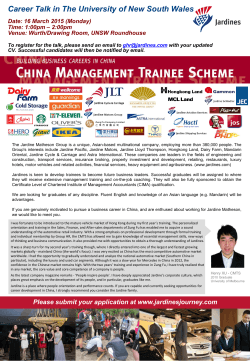
* Managing risk in construction projects – PwC
Managing risk in construction projects – how to achieve a successful outcome* Project risk and controls – Slaying the dragon Scott Jardine *connectedthinking PwC Contents Background to the dragon Project risk management Project controls Background “No construction project is risk free. Risk can be managed, minimised, shared, transferred, or accepted It cannot be ignored." Risk management - The commercial imperative … Sir Michael Latham 1994 Background • Project risks include…. • Quality and safety • Cost management • Time management (programme / schedule) • Scope & change management • Procurement & contracts • People management • Information management • External influences Managing risk in construction projects PricewaterhouseCoopers Page 4 January 2007 Background • What happens if it is ignored? • Increased costs • Loss or reduction in profit • Damage to brand / reputation; and at worst • Disposal of the business or insolvency Managing risk in construction projects PricewaterhouseCoopers Page 5 January 2007 Project risk management • How do you manage the risks? • Identification • Assessment / quantification • Reduction • Implementation • Monitoring Managing risk in construction projects PricewaterhouseCoopers Page 6 January 2007 Project risk management PMO Risk Analysis Steering Committee Project Risk Business & Regulatory Environment Business Scope & Change Control Quality & Safety Management Cost Management HR Management CAPITALe PROJECT Communication and Reporting Time Management (Schedule) Procurement & Contracts Issue Management Internal Audit External Assurance Regulatory Compliance Managing risk in construction projects PricewaterhouseCoopers Page 7 January 2007 Project risk management Business Policies Culture Project Risk Management Approach •Identification •Assessment / quantification •Reduction •Implementation •Monitoring Organisation Resources Tools and Techniques Managing risk in construction projects PricewaterhouseCoopers Page 8 January 2007 Project controls • Project controls • Policies and procedures to ensure the efficient coordination, monitoring and management of a project • What do project controls include? • Risks • Communication • Roles and responsibilities… • Are they separate? Managing risk in construction projects PricewaterhouseCoopers Page 9 January 2007 Project controls – integral components Managing risk in construction projects PricewaterhouseCoopers Page 10 January 2007 Project controls • Risks change throughout the project lifecycle and the controls need to match • Risk and uncertainty poses opportunities as well as challenges • Cost, time and quality impacts need to be considered together • Can consider them in ‘function’ groups Managing risk in construction projects PricewaterhouseCoopers Page 11 January 2007 Project Risk Management Life Cycle Matrix 1.0 Planning 2.0 Program 3.0 Design 1. Business Environment 1.1 Program Planning Process 2.1 Project Purpose Funding & Approval 3.1 Business Needs Review 2. Integration 1.2 Program Management Policy 2.2 Project Delivery Method 3.2 Project Integration Review 3. Scope & Change Control 1.3 Facilities Master Plan/Planning Process 2.3 Project Requirements Definition 3.3 Building Design 4. Time Management (Schedule) 1.4 Facilities Annual Plan (1-3 years) 2.4 Project Schedule Requirements 3.4 Baseline Project Schedule 5. Quality & Inspection 1.5 Facilities Design and Specification Standards 2.5 Project Concept Design & Themes 3.5 Design Review & Approval 6. Cost Management 1.6 Program Cost Management Guidelines 2.6 Project Funding & Capital Budgeting 3.6 Cost & Schedule Forecast 7. HR Management 1.7 Facilities Management Organization 8. Comms. & Reporting 1.8 Program Reporting Requirements 2.8 Project Reporting Requirements 3.8 Project Status 9. Safety, Insurance & Risk 1.9 Safety, Insurance & Risk Mgt Policies 2.9 Project Safety Program & Insurance Strategy 10. Procurement & Contracts 1.10 Contracting Approach & Controls 2.10 AE/CM/GC Selection & Contracting Project controls 4.0 Construction 5.0 Testing 4.1 Executive Oversight & Support 4.2 Daily Project Management Process 5.2 AE/CM/GC Contract Compliance Review 7.0 Ops & Maint 6.1 Continuous Improvement Review 6.2 Capital Project Review 7.2 Operations Project Planning Process 4.3 Change Control Process 6.3 User acceptance Process 7.3 Operations Acceptance Process 4.4 Detailed Schedule Management 6.4 Schedule Completion Check List 5.5 Conduct Inspections & Quality Review 4.5 Quality Assurance Process 6.5 Close Out Check List 6.6 Final Payment/ Retention Release 7.6 Operating Budget Process 5.7 Staff Reductions/ Transfers 6.7 Operations Staff Planning 7.7 Ongoing Requirements/Skills Review 4.8 Project Cost & Budget Variance 5.8 Project Quality Performance 6.8 Project Closeout Performance 7.8 Final Status & Financial Report 3.9 Safety Program Training & Compliance 4.9 Risk Tracking & Resolution 5.9 Safety & Risk Mgt Compliance 6.9 OCIP Close-out Review & Report 3.10 Subcontractor Qualification Process 4.10 Subcontractor Selection/ Contracting 5.10 Contract Compliance Review 6.10 Punch List 7.10 Vendor Qualification/ Selection 6.11 Confirm Issue Resolution 7.11 Ongoing Issue Page 12 Management process 2007 January 4.6 Cost Control 2.7 Project Management Staffing 11. 2.11 Project Issue Managing risk in construction projects 1.11 Issue Issue Management Management Policy Management Planning PricewaterhouseCoopers 6.0 Close-Out 3.11 Issue Tracking & Resolution Project controls • Each area of the project is analysed to identify … • Risks • Control procedures • Monitoring controls Managing risk in construction projects PricewaterhouseCoopers Page 13 January 2007 Project controls – Daily Project Management Process • Risks • Lack of knowledge of project tracking • Failure to recognise and develop responses to risk and opportunity • Lack of timely resolution of issues as raised by various stakeholders • Claims • Contract administration • Lack of compliance with project requirements • Unnecessary legal liabilities or loss of entitlement Managing risk in construction projects PricewaterhouseCoopers Page 14 January 2007 Project controls – Daily Project Management Process • Control procedures • Project management plan • Risk and opportunity registers • Issues registers • Clear documentation of contract procedures and the like • Regular, documented meetings to consider key risks Managing risk in construction projects PricewaterhouseCoopers Page 15 January 2007 Project controls – Daily Project Management Process • Monitoring controls • Compliance to prescribed policy and procedures • Regular project status meetings to review action list and responsibilities as agreed • Regular formal assurance and expediting reports • Formal up-to-date project management tools incorporating current information/issues and “as built” information Managing risk in construction projects PricewaterhouseCoopers Page 16 January 2007 Project controls - Summary • Project risk management is important to your business as a whole • Project controls provide a framework to manage the project • Project controls cover a full spectrum including, • Risks • Cost and schedule forecasting • Business needs Managing risk in construction projects PricewaterhouseCoopers Page 17 January 2007 Project controls - Summary • But are yours comprehensive? • Will it stand up to Internal Audit scrutiny by your business? • Are records suitable for dispute resolution? • Does the process have the knowledge or is it with the staff? • Control the risk and slay the dragon! Managing risk in construction projects PricewaterhouseCoopers Page 18 January 2007 For further information, please contact: Anthony Morgan Scott Jardine Tel: +44 (0)20 7213 4178 e-mail anthony.j.morgan@uk.pwc.com Tel: +44 (0)20 7212 4431 e-mail scott.jardine@uk.pwc.com This publication has been prepared for general guidance on matters of interest only, and does not constitute professional advice. You should not act upon the information contained in this publication without obtaining specific professional advice. No representation or warranty (express or implied) is given as to the accuracy or completeness of the information contained in this publication, and, to the extent permitted by law, PricewaterhouseCoopers LLP, its members, employees and agents accept no liability, and disclaim all responsibility, for the consequences of you or anyone else acting, or refraining to act, in reliance on the information contained in this publication or for any decision based on it. © 2007 PricewaterhouseCoopers LLP. All rights reserved. 'PricewaterhouseCoopers' refers to PricewaterhouseCoopers LLP (a limited liability partnership in the United Kingdom) or, as the context requires, other member firms of PricewaterhouseCoopers International Limited, each of which is a separate and independent legal entity. PwC
© Copyright 2025





















